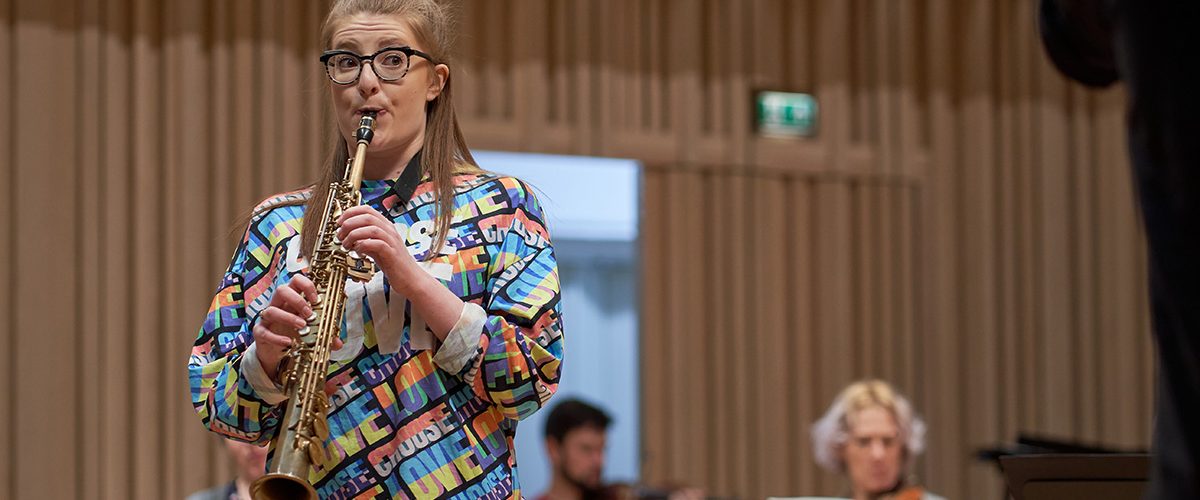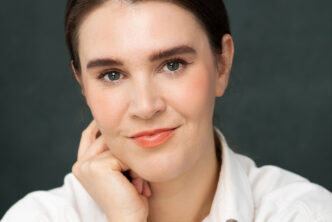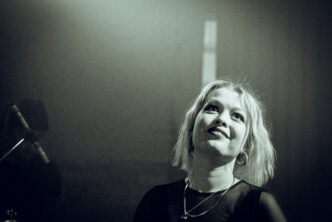Saxophonist Jess Gillam kicks off Manchester Camerata’s 50th anniversary year with a special programme which explores the unexpected and winding path of creative endeavour.
Jess found fame aged just 17 when she became the first saxophonist to reach the finals of BBC Young Musician and the youngest ever soloist to perform at the Last Night of the Proms. Soon after she became the first ever saxophonist to be signed exclusively to Decca Classics and her albums, Rise and Time, both reached No.1 in the UK Classical Music Charts.
Jess also presents a weekly show on BBC Radio 3, This Classical Life and encourages people at all levels of musical ability to get involved in performance with innovative projects like her Virtual Scratch Orchestra. Jess is a whirlwind of musical enthusiasm and has achieved all of this by the age of 23.
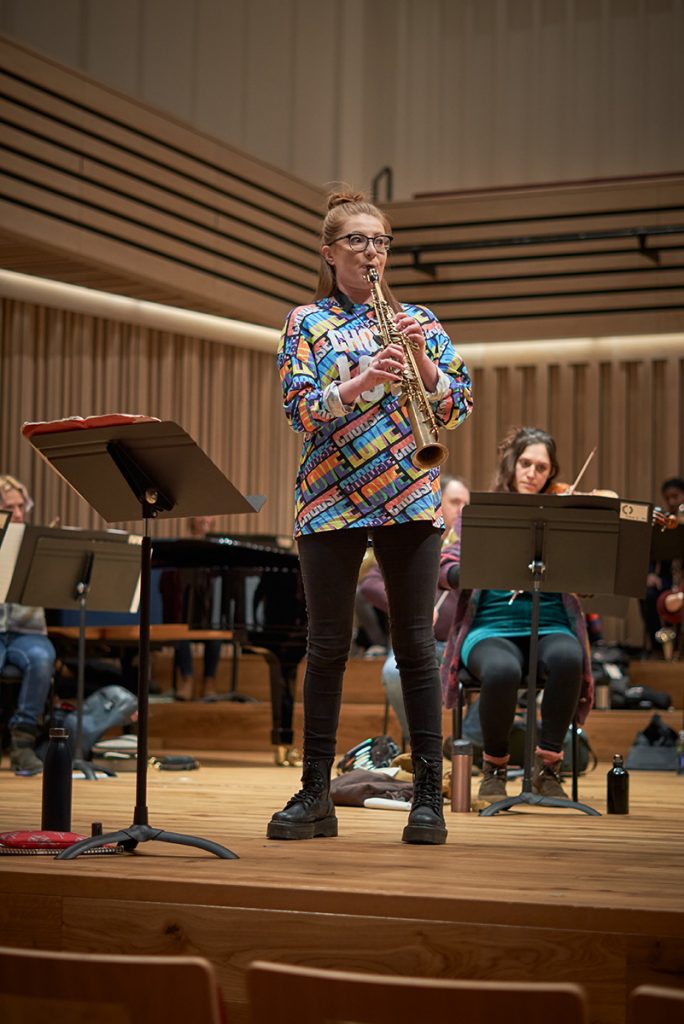
Can you tell us about the show, Jess Gillam with Manchester Camerata?
Jess: “It’s been put together in collaboration with the Manchester Camerata. They suggested some of the pieces they’d like to play, and I suggested some repertoire too and now we’ve got a really diverse programme actually that should hopefully be all tied together with the different atmospheres. We’ve got everything from Max Richter’s stillness and beauty to the fireworks in the Glazunov, so hopefully it’ll be an enjoyable concert”.
Do you play any other instruments as well as the saxophone?
Jess: “I’ll be playing soprano saxophone and alto saxophone. I don’t really play anything else other than those, but they’ve got really different sounds that in a way they are almost like individual instruments in themselves because they are so distinct”.
Can you tell us more about the concert’s theme of musical inspiration?
Jess: “I think inspiration can come from all over. It can be from meeting a person and having a conversation with them, because that’s what so much of music is about and inspired by – it’s stories of people and places and the Camerata themselves have come up with the theme about the path of creative endeavour and I can see how the pieces can fit into those. The Glazunov (Concerto in E-flat major for alto saxophone and string orchestra) for example, was inspired by the sound of the saxophone and that is quite tangible, but pieces can be inspired by political events, by stories, by people’s personalities – it can crop up when you are least expecting it.
How were you first introduced into music?
Jess: “I started playing saxophone when I was 7 years old and I picked it up at a community carnival centre in Cumbria, where I’m originally from. There were all different workshops on offer, and I’d tried everything and came to the saxophone last and just fell in love with the sound of it. I think I was really lucky to make a sound straight away and I just found that magnetising. It was probably a honk at that stage to be honest, but this huge sound coming out of this intriguing metal tubing was just fascinating to 7-year-old me and now I still love it”.
Was anyone in your family musical?
Jess: “My dad was a drummer and played a lot of Indie, rock-type music. My mum is not musical at all, but I’m lucky to come from a family that really love music – love listening to music and my dad playing the drums. I know not every young music student necessarily comes from a family who are really supportive about going down the musical path, but I was really lucky in that regard to have a supportive background”.
How did you keep up the momentum and get through the difficult phases when learning?
Jess: “It’s really interesting, you go through different stages, even now nothing is straight forward. You hear a lot of musicians talking about the fact that progress is never linear. You get better and then you go back 5 steps and then you go forward a couple and you’re constantly learning. I think an amazing thing about music is that it’s a job that you can never finish – and I say job, it’s more of a way of life – but it’s a learning process that never finishes. So growing up sometimes I would really feel like practising and other times my punishment if I’d been misbehaving would be that I wasn’t allowed to play saxophone. Then there would be other times when I would maybe need that encouragement to practise and realise that it was something that you needed to keep up regularly, but I was lucky to mainly enjoy it. And then I think it is more about getting inspired. If you don’t feel like practising, it’s finding the motivation and whether that’s watching a concert or watching a video, and just finding the inspiration again”.
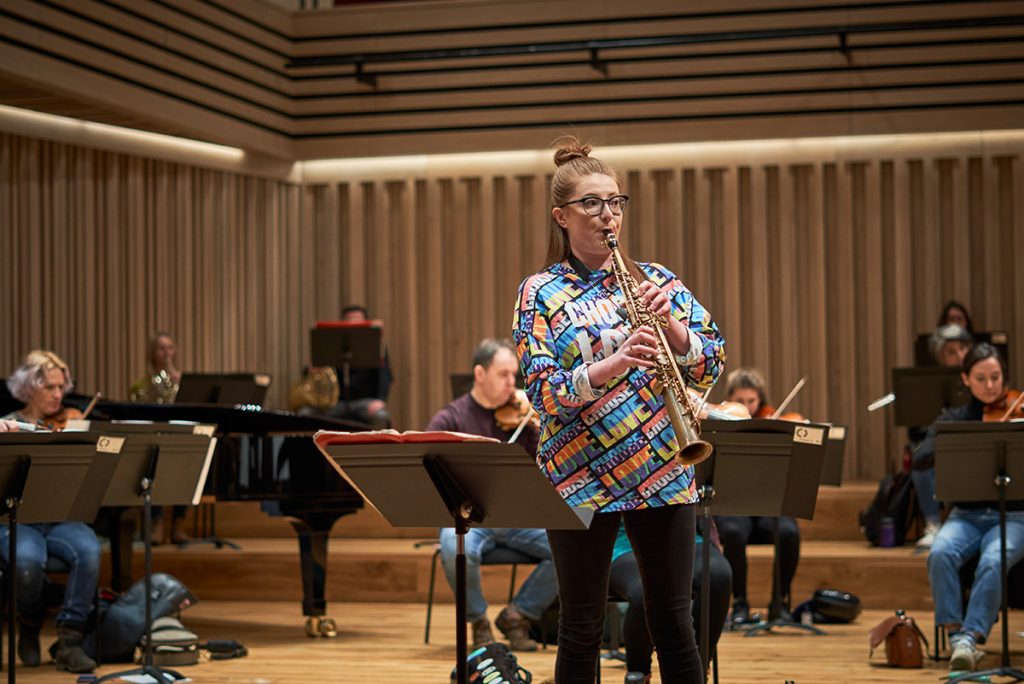
How much practise do you do?
Jess: “Now it totally varies. A couple of years ago when I was studying it was much more regular and I would practise for a set amount of hours a day. But now with touring, and I also do radio and television presenting, it completely varies from nothing to 5 or 6 hours depending on what’s happening in the day. It requires constant upkeep and constant learning and curiosity. So there’s the time that it takes and also managing the time when you have a career where you have to factor in the practising. You need to travel and perform and do all of these different things, but keeping up that relationship with the instrument and connection to the sound is really important. Sometimes that can be a bit hard to manage”.
At what point did you think about making music your career?
Jess: “I think when I was late teens. I first entered BBC Young Musician when I was 14, which is a national music competition which is televised, and then I knew already that I wanted to be a musician and I don’t think I’d really considered much else. I wanted to be a writer when I was much younger, before I started the saxophone, but then it just became what I did, it was just kind of who I was, and I didn’t really consider that I would do anything else and, as I mentioned, I was really lucky to come from a family who helped me find that path and helped me find that way to do that. So probably I think I knew from about 14 or 15 that this was going to be what I wanted to do”.
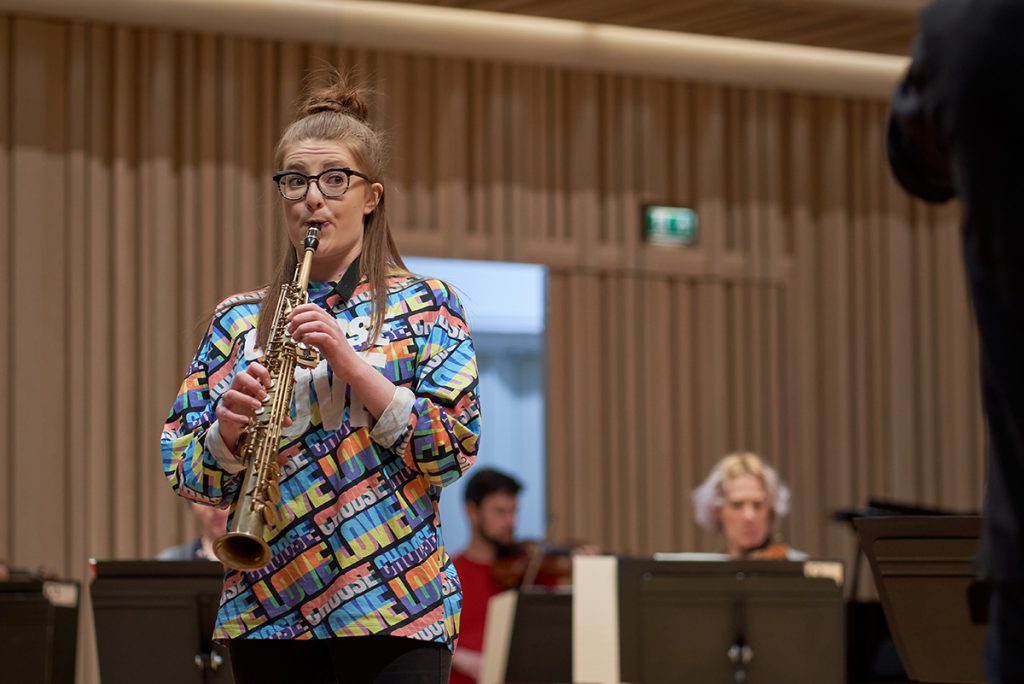
Were you always part of a school orchestra or band?
Jess: “Playing with other people was really important. It is interesting with the saxophone because it doesn’t always have a place in a traditional orchestra. Some pieces do call for it. I was part of different bands but I studied at the junior Royal Northern College of Music in Manchester, so I went there every Saturday from the age of about 13 or 14. I would travel down there and have the day working with different bands and ensembles and have my tuition there. Being part of a group with other young musicians was really important, I think that’s where you make some of your best friends through music and also where you learn so much because there is nothing better than being part of a huge group of people with a collective shared mission and making a massive sound”.
What was it like studying at the RNCM?
Jess: “I went to the junior Royal Northern College of Music and that was amazing – to meet other like-minded young musicians who I wouldn’t necessarily be meeting at school – that was my favourite day of the week, Saturday. Karen Humphreys, who runs that, is just incredible. And then I went to the Guildhall to study with John Harle, who was an amazing teacher as well. But going to Manchester weekly and being exposed to the cultural scene there, meeting people and getting a taste of the city was really inspiring as a young musician from Cumbria where it’s not the liveliest cultural place. Going to Manchester and seeing what was happening was brilliant. I went from the age of 14-18 to the RNCM and then I was going to go to the senior course but I was doing so much playing and was so busy just with my career that I didn’t complete my course but then I did a Masters at the Guildhall in lockdown”.
What would you say to a young person looking to make a career in music?
Jess: “I would say, listen to as much music as possible. There’s so much music out there and find the music that really speaks to you and that you really connect with. Then you can develop and look for an authentic voice and mission and something to say with your music. Take inspiration from music that you’re listening to and find your individuality within the music, find your voice, and share that with people. And don’t be afraid to try new things and go outside of the box. Create your own path and create your own career path because there are so many different possibilities with music. Of course, there are all the performing opportunities and playing in bands and playing with people, then there are so many parts of the musical industry and eco-system that you could go into something that you’re really passionate about. So, don’t close any doors, take every opportunity you can and be as authentic as you can”.
What would you say to people who like to try classical music but aren’t sure if it is for them?
Jess: “Classical music is such a broad term because it covers centuries of music, but there is so much within it. It can make you think that maybe the concert hall isn’t a place for you or it might not seem the most welcoming but I would say just give it a chance and go to a concert with a friend who maybe loves classical music and they can maybe tell you a bit about the piece. Or just listen and don’t be afraid to have opinions on it because everybody is equal in listening, we’re all listeners and all trying to take something from the music and there are so many different roads within it. It might be that you really love film music and orchestral music but you don’t necessarily love Baroque or you might find that you love the hard driving, I think almost raving rhythms of a lot of Baroque music, but give it a chance and don’t close the door on it because there is so much within it to enjoy, there is something for everyone”.
Jess Gillam with Manchester Camerata is at The Stoller Hall on Friday 11 March 2022.
Jess is also playing with Manchester Camerata at the Wigmore Hall in London on 20 March 2022.

